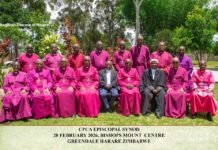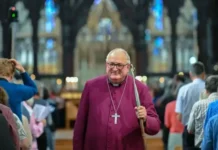Bishop Robert [Innes] has expressed concerns regarding a new draft law in Denmark that could require translation into Danish of addresses and sermons delivered by religious leaders.
In a letter to the Danish Prime Minister and Minister for Ecclesiastical Affairs Bishop Robert has expressed the hope that the Danish Government “will pause to reflect on the potential implications of proposals to require the translation of sermons preached at church services into Danish. I believe this overly restrictive step would constitute a limitation on freedom of expression, which I know is prized in Denmark, as one of the world’s oldest democracies.”
Leaders of the Evangelical Lutheran Church in Denmark, Greenland and the Faeroes have written publicly on the issue to Government Ministers with a letter published in the Christian national daily newspaper in Denmark. In their letter, the Bishop of Copenhagen in the Danish national Church, the Folkekirken, Bishop Peter Skov-Jacobsen and his fellow bishops said:
“… we are risking that the Danish State neglects the recognition of non-Danish speaking congregations as being part of the ecclesiastical and cultural life of Denmark. It would cause great harm, should the many Danish congregations abroad face similar action from foreign states. Passing the bill would furthermore damage the reputation of Denmark in the rest of the world.”
Speaking this week to the national Danish daily newspaper, Jyllands-Posten, The Revd Smitha Prasadam, the Anglican chaplain in Denmark, also noted her concerns about the proposed legislation, saying:
“Any sermon depends on Biblical text and context; the scripted and unscripted; the dynamic between preacher and congregation … in a translation, how would nuance, meaning and emphasis be carried? There is a degree of sophistication which would demand more professional skill which would then carry time and financial implications. Sermon preparation varies in content and delivery. Sometimes I write out the whole script. Other times headlines or bullet points only. Sometimes (even when I have a whole scripted sermon to hand) I preach off the cuff as prompted by the Holy Spirit.”
Ecumenical partners across Europe have also voiced their concerns about the proposed legislation, including the Roman Catholic Commission of the Bishops’ Conferences of the European Union (COMECE) the Lutheran World Federation and the Conference of European Churches (CEC).
It is understood that the Danish Government is due to determine its position regarding the passage of the draft law through the Danish Parliament, the Folketing, in the coming weeks.
Bishop Robert added:
“Proposals to require translation of sermons into a national language are illiberal and anti-freedom of speech. We have tended to devote effort on protecting religious freedom of expression and belief outside Europe. We’re now also seeing an urgent need to act on these fundamental issues across Europe itself. The consequences of restricting these freedoms are concerning and far-reaching.”




I think the subject title should read “translate into Danish”. I suppose they want Danish spoken in churches. In any event it is unclear why a sermon needs to be submitted to the government?
[…] of the world’s oldest democracies,” Anglican Bishop Robert Innes of the European dioceses wrote in a letter to […]
[…] also told the website Anglican Ink that requiring preachers to send their sermons to the government after being translated into Danish […]
[…] also told the website Anglican Ink that requiring preachers to send their sermons to the government after being translated into Danish […]
[…] also told the website Anglican Ink that requiring preachers to send their sermons to the government after being translated into […]